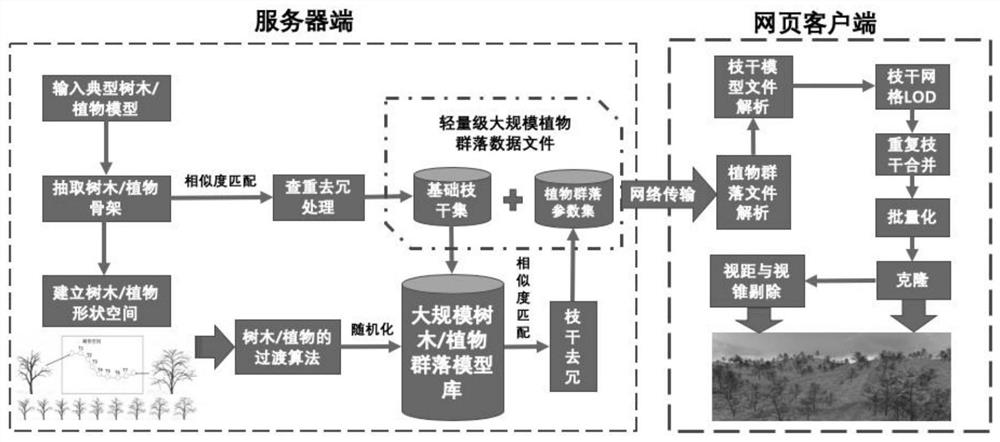Lightweight modeling and visualization method for large-scale plant communities on the web
A plant community, lightweight technology, applied in network data browsing optimization, network data retrieval, 3D image processing and other directions, can solve problems such as too much pressure on data transmission, not identical trees, long modeling time, etc. Achieve the effect of saving memory, realizing lightweight construction, and improving data transmission speed
- Summary
- Abstract
- Description
- Claims
- Application Information
AI Technical Summary
Problems solved by technology
Method used
Image
Examples
Embodiment 1
[0064] Example 1, arbor modeling:
[0065] The most important part of arbor modeling should be skeleton extraction. The more accurate the skeleton extraction, the higher the naturalness and authenticity of the arbor model. Although the cost of plant modeling based on rules and sketches is low, the authenticity is poor and the quality of the model is low. Although the image-based plant modeling method has high authenticity and accurate models, it is easily disturbed by noise. The plant modeling method based on point cloud has high model quality, but the cost of building the model is high and the modeling time is long. Through the analysis of the above modeling methods, a new arbor modeling method is proposed, which uses skeleton points and circular frustum splicing to form the arbor skeleton.
[0066] Skeleton point information is mentioned many times in lightweight modeling. Skeleton points are very important feature points in arbor modeling and important information for bui...
Embodiment 2
[0084] Embodiment two, shrub community landscape modeling
[0085] The growth characteristics of shrubs are different from those of trees, but compared with herbaceous plants and crops, there are more characteristics between shrubs and trees. Therefore, this application provides another shrub modeling method, the transformation from arbor to shrub, through this This method not only provides a large number of shrub models, but also achieves a more realistic shrub landscape.
[0086] For the difference between shrubs and trees, there are four main points in the process of turning trees into shrubs:
[0087] First, the trunk should be as small as possible. This is a big difference between shrubs and trees. The trunk of the tree is thick and the growth nodes of the branches are high, while the growth nodes of the branches of the shrub are low, and the trunk cannot even be distinguished. Therefore, the first The first step is to shrink the trunk of the arbor, which can be reduced ...
Embodiment 3
[0098] Example 3, modeling of crop community landscape and herbaceous plant landscape
[0099] Unlike trees and shrubs, there is too much difference between crops and herbaceous plants. Herbaceous plants are different from leaves to flowers. Compared with the other three types of plants, herbaceous plants are very short and have almost no skeleton, so they are not suitable for transition algorithm. At present, the most common way of modeling herbaceous plants is to use textures instead of models. The first reason is that textures are smaller than models, and the pressure on memory and rendering is also lower. Another reason is that herbaceous plants appear in large numbers in forest scenes. , the order of magnitude is the largest, but it is very small and difficult to observe, so the use of textures is the most ideal modeling method.
[0100] Since the modeling method of texture is adopted, it is difficult to avoid the observation of "patches". The flower on the left is almos...
PUM
 Login to View More
Login to View More Abstract
Description
Claims
Application Information
 Login to View More
Login to View More - R&D
- Intellectual Property
- Life Sciences
- Materials
- Tech Scout
- Unparalleled Data Quality
- Higher Quality Content
- 60% Fewer Hallucinations
Browse by: Latest US Patents, China's latest patents, Technical Efficacy Thesaurus, Application Domain, Technology Topic, Popular Technical Reports.
© 2025 PatSnap. All rights reserved.Legal|Privacy policy|Modern Slavery Act Transparency Statement|Sitemap|About US| Contact US: help@patsnap.com



